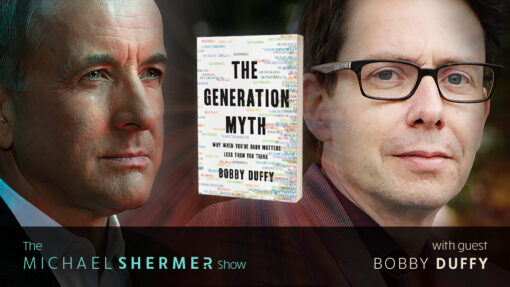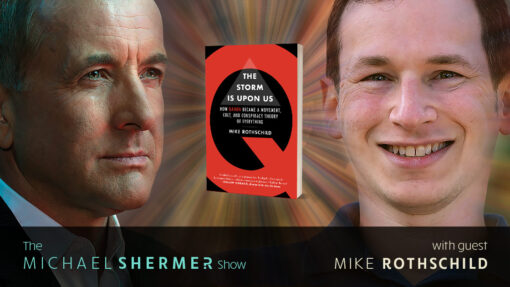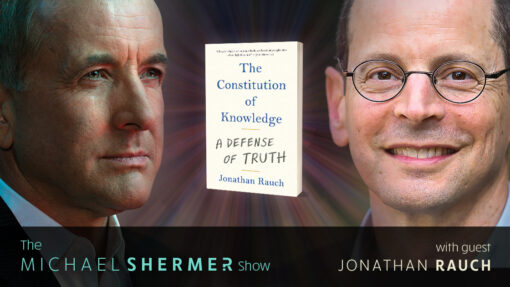In episode 232, Michael Shermer speaks with neuroscientist and professor of psychology, Amishi Jha, about how to achieve Peak Mind, based on her book Peak Mind: Find Your Focus, Own Your Attention, Invest 12 Minutes a Day.
Tags
-
browse by topic
social media
eSkeptic for Dec 4, 2021
Suzanne Nossel on defending free speech for all, based on her book Dare to Speak

In episode 226, Michael Shermer speaks with a leading voice in support of free expression, Suzanne Nosel, on defending free speech for all, based on her book Dare to Speak. Nossel delivers a vital, necessary guide to maintaining democratic debate that is open, free-wheeling but at the same time respectful of the rich diversity of backgrounds and opinions in a changing country.
eSkeptic for November 13, 2021
In episode 226, Michael Shermer speaks with a leading voice in support of free expression, Suzanne Nosel, on defending free speech for all, based on her book Dare to Speak. Nossel delivers a vital, necessary guide to maintaining democratic debate that is open, free-wheeling but at the same time respectful of the rich diversity of backgrounds and opinions in a changing country.
Bobby Duffy on The Generation Myth: Why When You’re Born Matters Less Than You Think

Boomers are narcissists. Millennials are spoiled. Gen Zers are lazy. We assume people born around the same time have basically the same values. But, do they? In episode 224 Michael Shermer speaks with social researcher Bobby Duffy who has spent years studying generational distinctions. In The Generation Myth, he argues that our generational identities are not fixed but fluid, reforming throughout our lives.
eSkeptic for November 6, 2021
Boomers are narcissists. Millennials are spoiled. Gen Zers are lazy. We assume people born around the same time have basically the same values. But, do they? In episode 224 Michael Shermer speaks with social researcher Bobby Duffy who has spent years studying generational distinctions. In The Generation Myth, he argues that our generational identities are not fixed but fluid, reforming throughout our lives.
eSkeptic for October 2, 2021
In episode 214, Michael Shermer speaks Tom Nichols about his book Our Own Worst Enemy: The Assault From Within on Modern Democracy. PLUS, don’t miss our digital subscription sale: $14.99 for 7 issues, until October 9, 2021!
Tom Nichols — Our Own Worst Enemy: The Assault From Within on Modern Democracy

Democracy is in trouble. Why? In episode 214, Michael Shermer speaks with Tom Nichols about his book Our Own Worst Enemy: The Assault From Within on Modern Democracy challenges the current depictions of the rise of illiberal and anti-democratic movements in the United States and elsewhere, placing on the people themselves, the growth of unchecked narcissism, rising standards of living, global peace, and a resistance to change.
Mike Rothschild on how QAnon became a movement, cult, and conspiracy theory of everything, based on his book The Storm Is Upon Us

Its messaging can seem cryptic, even nonsensical, yet for tens of thousands of people, it explains everything: What is QAnon, where did it come from, and is the Capitol insurgency a sign of where it’s going next? Mike Rothschild is a journalist specializing in conspiracy theories. He has been collecting stories for years through interviews with QAnon converts, apostates, and victims, as well as psychologists, sociologists, and academics. He is uniquely equipped to explain the movement and its followers.
eSkeptic for September 28, 2021
In episode 213, Michael Shermer speaks with Mike Rothschild, a journalist specializing in conspiracy theories, about QAnon and its followers, based on his book The Storm Is upon Us: How QAnon Became a Movement, Cult, and Conspiracy Theory of Everything. PLUS, we present as a free PDF download the Memorial Tribute to Skeptic’s Art Director and Co-Founder, Pat Linse, which appeared in Skeptic 26.3 (2021).
Jonathan Rauch — The Constitution of Knowledge: A Defense of Truth

In episode 190, Michael Shermer speaks with Jonathan Rauch as he reaches back to the parallel eighteenth-century developments of liberal democracy and science to explain what he calls the “Constitution of Knowledge” — our social system for turning disagreement into truth.
eSkeptic for June 26, 2021
In episode 190, Michael Shermer speaks with Jonathan Rauch as he reaches back to the parallel eighteenth-century developments of liberal democracy and science to explain what he calls the “Constitution of Knowledge” — our social system for turning disagreement into truth.
eSkeptic for January 12, 2021
In this monologue commentary on the events of January 6, 2021, Dr. Shermer applies causal inference theory to Trump’s speech that morning, the violent assault on the Capitol that followed, the banning of Trump off social media platforms like Twitter and Facebook, the fears on the Right of social media censoriousness on the Left, the breaking up of big tech social media companies, and related topics, including what it means to “believe” a conspiracy theory.
Trump & Truth — A Commentary by Michael Shermer

In this monologue commentary on the events of January 6, 2021, Dr. Shermer applies causal inference theory to Trump’s speech that morning, the violent assault on the Capitol that followed, the banning of Trump off social media platforms like Twitter and Facebook, the fears on the Right of social media censoriousness on the Left, the breaking up of big tech social media companies, and related topics, including what it means to “believe” a conspiracy theory.
eSkeptic for December 12, 2018
In his December 2018 ‘Skeptic’ column for Scientific American Michael Shermer discusses how to avert a looming crisis among today’s youth.
eSkeptic for September 26, 2018
Have Archetype—Will Travel by Michael Shermer attempts to explain the startling phenomenon of Jordan Peterson; not the man’s ideas so much as his message and following, which has grown astronomically in the past two years, from obscure Canadian professor of psychology to international man of mystery: mysterious to nearly everyone, that is, on exactly what it is he believes.
Have Archetype — Will Travel: The Jordan Peterson Phenomenon

Michael Shermer attempts to explain the startling phenomenon of Jordan Peterson; not the man’s ideas so much as his message and following, which has grown astronomically in the past two years, from obscure Canadian professor of psychology to international man of mystery: mysterious to nearly everyone, that is, on exactly what it is he believes.
Newsrooms Building Online Tools Skeptics Can Use
Tim Farley takes a look at a perhaps unexpected source of online tools of use for skeptics—the newspaper industry.
The Sense of Style: The Thinking Person’s Guide to Writing in the 21st Century
Why is so much writing so bad, and how can we make it better? Is the English language being corrupted by texting and social media? Do people write badly on purpose, to obfuscate and impress? Have dictionaries abandoned their responsibility to safeguard correct usage? Do kids today even care about good writing? In his latest book the Harvard linguist, cognitive scientist, bestselling author (The Language Instinct, How the Mind Works, The Blank Slate, and The Better Angels of Our Nature)…
SKEPTIC App
Whether at home or on the go, the SKEPTIC App is the easiest way to read your favorite articles. Within the app, users can purchase the current issue and back issues. Download the app today and get a 30-day free trial subscription.










